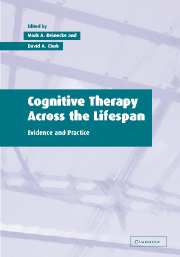Book contents
- Frontmatter
- Contents
- List of contributors
- Foreword
- 1 Cognitive therapy across the lifespan: conceptual horizons
- 2 Cognitive theory and therapy of depression
- 3 Cognitive theory and therapy of bipolar disorders
- 4 Regulation of emotion in generalized anxiety disorder
- 5 Cognitive theory and therapy of obsessions and compulsions
- 6 The cognitive model of panic
- 7 Treating obsessional problems using cognitive-behavioral therapy
- 8 Narcissistic personality disorder
- 9 Cognitive therapy and the self
- 10 Promoting cognitive change in posttraumatic stress disorder
- 11 Cognitive theory and therapy of social phobia
- 12 The cognitive model of bulimia nervosa
- 13 Cognitive therapy and schizophrenia
- 14 Cognitive-behavioral interventions for alcohol abuse and dependence
- 15 Cognitive approaches to understanding, preventing and treating child and adolescent depression
- 16 Cognitive-behavioral interventions in childhood anxiety disorders
- 17 Attention deficit/hyperactivity disorder
- 18 Cognitive-behavioral interventions for children with conduct problems
- 19 Processes of change in cognitive therapy
- 20 Cognitive therapy in the twenty-first century: current status and future directions
- Index
3 - Cognitive theory and therapy of bipolar disorders
Published online by Cambridge University Press: 05 July 2014
- Frontmatter
- Contents
- List of contributors
- Foreword
- 1 Cognitive therapy across the lifespan: conceptual horizons
- 2 Cognitive theory and therapy of depression
- 3 Cognitive theory and therapy of bipolar disorders
- 4 Regulation of emotion in generalized anxiety disorder
- 5 Cognitive theory and therapy of obsessions and compulsions
- 6 The cognitive model of panic
- 7 Treating obsessional problems using cognitive-behavioral therapy
- 8 Narcissistic personality disorder
- 9 Cognitive therapy and the self
- 10 Promoting cognitive change in posttraumatic stress disorder
- 11 Cognitive theory and therapy of social phobia
- 12 The cognitive model of bulimia nervosa
- 13 Cognitive therapy and schizophrenia
- 14 Cognitive-behavioral interventions for alcohol abuse and dependence
- 15 Cognitive approaches to understanding, preventing and treating child and adolescent depression
- 16 Cognitive-behavioral interventions in childhood anxiety disorders
- 17 Attention deficit/hyperactivity disorder
- 18 Cognitive-behavioral interventions for children with conduct problems
- 19 Processes of change in cognitive therapy
- 20 Cognitive therapy in the twenty-first century: current status and future directions
- Index
Summary
This chapter will explore the evolution of cognitive theory and therapy for individuals with bipolar disorders (BP). Unlike most of the other chapters, there is only a small body of research data available on these topics. Until recently, BP were widely regarded as a biological illness best treated with medications (Prien and Potter, 1990; Scott, 1995a). This view is gradually changing for two reasons. First, in the past three decades, there has been a greater emphasis on stress-diathesis models. This has led to the development of new etiological theories of severe mental disorders that emphasize psychological and social aspects of vulnerability and risk. It has also increased the acceptance of brief psychological therapies, such as cognitive therapy (CT), as an adjunct to medication for individuals with treatment-resistant schizophrenia, and severe and chronic depressive disorders (Scott and Wright, 1997). Second, there is a significant efficacy-effectiveness gap for pharmacological treatments for BP (Guscott and Taylor, 1994).Mood stabilizer prophylaxis protects about 60% of individuals against relapse in research settings, but protects only 25-40% of individuals against further episodes in clinical settings (Dickson and Kendall, 1986). The introduction of newer medications has not improved prognosis (Scott, 1995a). This has also increased interest in other treatment approaches in BP.
This chapter explores cognitive models of BP and the empirical support for these models. It comments on the clinical applicability of CT for BP and reviews the outcome studies available.
- Type
- Chapter
- Information
- Cognitive Therapy across the LifespanEvidence and Practice, pp. 40 - 59Publisher: Cambridge University PressPrint publication year: 2003
- 1
- Cited by



